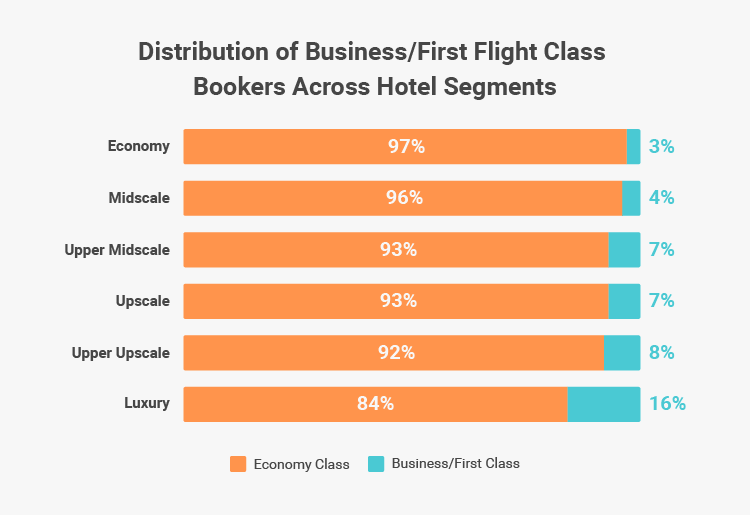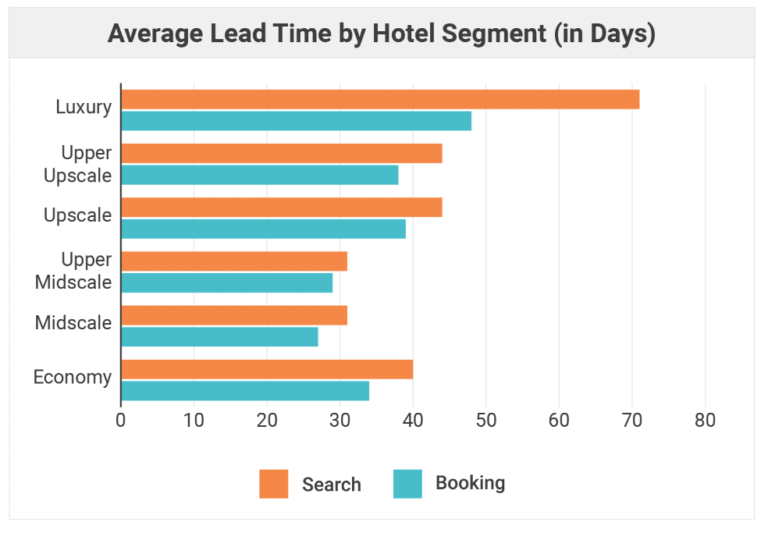
A traveler’s behavior can vary not only with how and where they search and book, but it can vary depending on other experiences during their trip, such as their flight class.
NB: This is an article from Sojern
In Sojern’s latest Hotel Insights Report, we dove into these differences and how hotel marketers can target the individuals who are the right fit for their offerings.
Each hotel segment, from economy to luxury, has a different way of connecting with travelers. Since economy travelers have specific travel requirements as per location, time, and price, they quickly search and book; whereas, luxury travelers take their time to research and decide, looking for that perfect experience. But can the extremely different path to purchases be combined to deliver the ideal experience?
3 Booking Behavior Insights to Know:
1. The correlation between a flight seat and the hotel type.
Luxury hotel guests are unique in a number of ways. They conduct more searches, they start planning earlier, and their mobile patterns differ from other hotel segments. They also tend to book flights at higher price points.
Luxury hotel bookings are more likely to be combined with business or first class flight bookings.

Knowing that flight booking behavior shows a correlation between flight class and hotel segment, hotel marketers can target travelers in their segment for more relevant messaging. It’s very predictable that if you book an economy class flight, you will be very likely to book an economy hotel. And the same could be said for first class tickets with luxury hotels. But what about the midscale, upper midscale, upscale, and upper upscale hotels? There is an untapped opportunity here to sway both economy and first class ticket holders in either direction, since the mid-scale hotel market does not have a definitive hold on the seat class. Imagine if a traveler books economy seat to arrive at the perfect time and to save money, they might look to stay at a luxury hotel. Their flight is one of purpose, whereas the hotel stay is one of experience.
2. Booking lead times vary by hotel type.
While dreaming about travel is ongoing, it’s important to be in front of the customer at the right time. To complicate it even more, it is a challenge to find the perfect lead time for serving hotel ads, and it varies segment to segment.
One would think that the more affluent the segment, the longer the average lead time. However, only the luxury hotels see a long lead time; whereas, all the other five hotel segments relatively have the same lead time. And surprisingly, midscale and upper midscale have the shortest search times. Economy, upscale, and upper upscale share the same times for search and booking.

When travelers search for luxury hotels, the average time gap between search and booking is considerately larger, meaning higher-end travelers are putting more research into selecting the best possible lodging experience. This gives luxury hotels and resorts a longer opportunity to provide the traver inspiration and capture their interest in both the dreaming and the planning stage.
Luxury hotels can learn from other segments by targeting audiences based on traveler intent data—capturing their interest earlier in the funnel and away from competitors. Make the process easier for the traveler to propel luxury bookings into the last minute space with a seamless website for booking, attention catching ads that lead straight to booking pages, and a mobile purchase process that’s user friendly.
3. Attracting the Millennial and Gen Z travelers
Travel habits have altered drastically as Millennials and now Gen Z have entered the workplace. Results from an Expedia Media Solutions poll show that millennials travel the most, 35 days each year, but were followed closely by Gen Z travelers, who travel 29 days each year while Gen X travels the least.
Millennials and Gen Z want to spend money on great experiences over items and luxury hotels are a great experience. Millennials are settling into comfier vacations with 83 percent of Millennials said they prefer all-inclusive and other worry-free vacations, and 70 percent staying in hotels on their last trip. This is the perfect market for luxury hotels with all-inclusive options. Luxury hotels can display their experiences over their amenities in order to attract younger guests.
Don’t forget about social and mobile! Almost 90% of Gen Z is influenced by social media when making travel plans and purchases. Connect with Gen Z by having a presence on Facebook and Instagram as well as optimizing mobile bookings.




